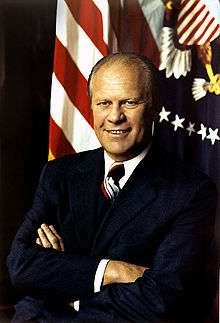F. David Mathews
| Forrest David Mathews | |
|---|---|
 | |
| 11th United States Secretary of Health, Education, and Welfare | |
|
In office August 8, 1975 – January 20, 1977 | |
| President | Gerald Ford |
| Preceded by | Caspar Weinberger |
| Succeeded by | Joseph A. Califano, Jr. |
| Personal details | |
| Born |
December 6, 1935 Grove Hill, Alabama[1] |
| Political party | Unaffiliated |
| Alma mater |
University of Alabama (B.A.) Columbia University (Ph.D.) |
Forrest David Mathews (born December 6, 1935) served as the 11th United States Secretary of Health, Education, and Welfare from 1975 to 1977, during the administration of President Gerald R. Ford. He also served two nonconsecutive terms as the president of the University of Alabama. Since the 1980s he has been president and chief executive officer of the Kettering Foundation. He is the author of several books on democratic practice and education.
Early life and education
Mathews was born and grew up in Grove Hill, Alabama. He attended the University of Alabama (AB in history and classical Greek, 1958) and Columbia University (PHD in history, 1965). Mathews was president of the University of Alabama 1969–75, 1977–1980, an era of significant change and innovation. At age 33, Mathews was the university's youngest president.[2] He presided over the integration of the university's football program under Hall of Fame coach Bear Bryant in 1971.
"resignation last year of University of Alabama president David Matthews following a vote that showed little faculty support for him. " January 15, 1981 The Anniston Star from Anniston, Alabama · Page 1
Political life
Mathews is one of only two surviving secretaries of the now defunct Department of Health, Education, and Welfare (the other is his successor, Joseph A. Califano, Jr.). While at HEW, he worked on restoring public confidence in government and reforming the regulatory system. At his swearing in as secretary of HEW, Gerald Ford said, “Mathews brings to this new mission the strength of youth, a sense of purpose, the skills of a scholar, and the trusted record of a successful leader and administrator. That is an impressive inventory by any standard.”[3]
Later life
Mathews currently serves as president and chief executive officer of the Kettering Foundation, a not-for-profit research foundation rooted in the American tradition of invention. Charles F. Kettering, best known for inventing the automobile self-starter, created the foundation in 1927. Gradually, the foundation expanded its focus to look beyond scientific solutions, recognizing that problems like world hunger are not technical problems, but rather political problems. In the 1970s, the foundation began to concentrate on democratic politics, particularly the role of citizens. Mathews was elected to the Kettering Foundation board of trustees in 1972, and in 1981, he became its president and CEO.

Boards and foundations
Mathews serves on the board of a variety of organizations, including the Gerald R. Ford Foundation, National Issues Forums Institute,[4] Council on Public Policy Education,[5] and Public Agenda.[6] He has received numerous awards, including a citation as one of the Ten Outstanding Young Men in the Nation (Ten Outstanding Young Americans), United States Jaycees (1969); member, Alabama Academy of Honor[7] (1973); Nicholas Murray Butler Medal in Silver, Columbia University (1976); Educator of the Year, Alabama Conference of Black Mayors (1976); and the Brotherhood Award, National Conference of Christians and Jews (1979).
Awards
He was inducted into the University of Alabama College of Communication and Information Sciences Hall of Fame in 2004 and into the Alabama Healthcare Hall of Fame in 2006. In 2007, the Alabama Center for Civic Life was renamed in his honor as the David Mathews Center for Civic Life. He is the recipient of 16 honorary degrees.
Publications
Mathews has written extensively on such subjects as education, political theory, southern history, public policy, and international problem solving. His books include Why Public Schools? Whose Public Schools?[8] (NewSouth Books,[9] 2003); For Communities to Work (Kettering Foundation, 2002); Politics for People: Finding a Responsible Public Voice[10] (University of Illinois Press,[11] 1999); and Is There a Public for Public Schools? (1996). His most recent book, Reclaiming Public Education by Reclaiming Our Democracy (Kettering Foundation Press, 2006), focuses on the relationship between the public and public education.
See also
References
- ↑ Robert, David (1990). Biographical Directory of the United States Executive Branch, 1774-1989. Greenwood Publishing Group. p. 246.
- ↑ Archived March 4, 2005, at the Wayback Machine.
- ↑ "Gerald R. Ford: Remarks at the Swearing In of David Mathews as Secretary of Health, Education, and Welfare". Presidency.ucsb.edu. August 8, 1975. Retrieved September 16, 2013.
- ↑ "National Issues Forum". Nifi.org. Retrieved September 16, 2013.
- ↑ Archived July 5, 2008, at the Wayback Machine.
- ↑ "Public Agenda : Our Story : Who We Are". Publicagenda.org. Retrieved September 16, 2013.
- ↑ "Welcome to the Alabama Academy of Honor". Archives.state.al.us. May 1, 2013. Retrieved September 16, 2013.
- ↑ "Why Public Schools? Whose Public Schools?". NewSouth Books. Retrieved September 16, 2013.
- ↑ "NewSouth - NewSouth Books, Junebug Books, Court Street Press". Newsouthbooks.com. Retrieved September 16, 2013.
- ↑ "UI Press | David Mathews | Politics for People: Finding a Responsible Public Voice". Press.uillinois.edu. Retrieved September 16, 2013.
- ↑ "UI Press | University of Illinois". Press.uillinois.edu. Retrieved September 16, 2013.
| Political offices | ||
|---|---|---|
| Preceded by Caspar Weinberger |
United States Secretary of Health, Education, and Welfare August 8, 1975 – January 20, 1977 |
Succeeded by Joseph A. Califano, Jr. |
External links
- David Mathew's speeches and photographs during his time as president of The University of Alabama from University Libraries Division of Special Collections
